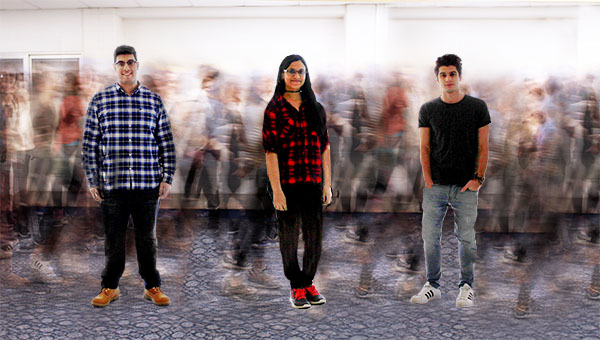Foreign students adjust to South, American lifestyle

Foreign Faces: From left to right, senior Omar Haddad from Jordan, senior Anitta Reji from India and senior Odysseas Lazarou from Greece represent a small portion of South students from foreign countries. Not included in the above photo is junior Debbie Kim, originally from North Korea and attending her first year at South. These four students make up a small sampling of South’s international student population. Photo illustration by Yoon Kim
March 21, 2017
The uncertainty associated with the first day of school kindles delight for some. But for others, such as South’s many students from foreign countries, entering a new school environment sparks a source of angst. For senior Odysseas Lazarou, his first day of school was his second day in America.
After growing up in Greece for 17 years, Lazarou says he was surprised when his parents told to him that their family was planning on moving to America. Lazarou was to come to America first and the rest of his family was to follow in later months.
“I was really excited about the idea of traveling alone and doing something that was totally different from everything I knew so far,” Lazarou said. “But leaving my parents after 17 years made me really sad too.”
Junior Debby Kim said her journey from North Korea to America was difficult because not only did she leave family, but she and her father had to face the challenges brought along by North Korea’s political climate.
“The police officers in North Korea are all looking for those people who travel without passports,” Kim said. “Leaving [my] hometown and grandma [was] another difficult thing. To cross the [Yalu River], which is the border of China and North Korea, that was the most difficult part.”
Once in America, Lazarou says one of the largest barriers has been learning to speak English. However, according to Lazarou, he joined Hellenic Club, where he met lots of people who were not only curious about his story but were reliable resources to make him feel more comfortable at South.
“At first, my English was poor and I could not communicate easily with others,” Lazarou said. “It was nice meeting people who speak my language and would take the time to get to know me. There was always someone [available] to answer my questions or to give me advice.”
Similarly for senior Anitta Reji, who emigrated from India in April 2016, transitioning to life in America presented her with unforeseen challenges that she combated by seeking employment.
“[During] the first few weeks [of] living here, [life] was so boring and I had no friends that I could talk to,” Reji said. “[But my] job at Subway helped me improve my English speaking because I got [the] opportunity to talk with different people on a [daily basis].”
Since his arrival, Lazarou has been impressed with South’s quality of education and plentiful opportunities that are at his fingertips.
“What I like about [GBS] is that you have the opportunity to explore your skills and abilities […] and reach your full potential,” Lazarou said. “All of the teachers and students [have been] so friendly and welcoming. Everyone I met helped make my transition from one environment to another a smooth one.”
For senior Omar Haddad, South was not at all what he had initially expected it to be. He says he arrived in the summer of 2016 from Jordan, already eager to get beyond high school. However, according to Haddad, once accustomed with the school, he was pleasantly surprised by South.
“My first impression of [GBS] was very [negative], mostly because I was nervous about making new friends and learning English,” Haddad said. “Now that I have been here, I love everything [about] GBS, [especially] the clubs and activities. I feel like I [have been] at [GBS] since freshman year, because I [have gotten] involved in everything I love to do.”
Because of his positive experience at South, Haddad is considering becoming a teacher to help other students like himself.
“Since [coming] to GBS, I have started to think about teaching as a possible [career],” Haddad said. “The teachers at GBS helped [me realize] that education is a wonderful thing and that I would love to help others, too.”
Through interactions with her teachers and peers, Reji also found South to be a supportive and diverse community that has taught her to value ideas and cultures that differ from her own.
“I have met so many people from different countries who I share a [similar story] with,” Reji said. “It is awesome that we get to experience GBS, and its opportunities together.”
According to Kim, she has enjoyed conversing with her teachers about her life back in North Korea as she is able to share her story.
“I feel like [by telling] another person about my history, more people know about North Korea,” Kim said.
According to Kim, the opportunities present at South represent the many possibilities America has to offer.
“Everything [in North Korea] is controlled by the government,” Kim said. “Our opinions [weren’t] important. Here in America, if I do my best, there is no block that stops me to develop.”


